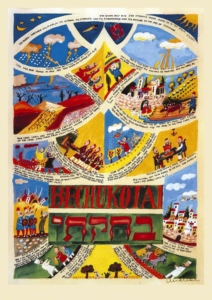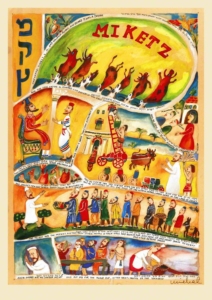MY DAILY LIFE TORAH COACH:
Parshat Lech Lecha n.3
Go Forth
Genesis 12:1−17:27
Navigating Life’s Journey with Ancient Insights
click the image to view it in the online store
G-d calls on Abraham to leave the land of his birth, and in response he and Sarah begin their journey to a new land and a new kind of faith, that will become the background and location of the adventure of Jewish history.
There are some setbacks at first. There is a famine and they have to leave the Land of Israel. There is an argument between Abraham and his nephew Lot’s households, and they part ways. Lot is then captured in a local war, and Abraham has to fight a battle to free him.
G-d then makes a covenant with Abraham, who has not yet had a child. He has a son by Sarah’s handmaid Hagar, but G-d tells him this is not the heir to the covenant. The sign of this covenant is Brit Milah (circumcision).
Why Lech Lecha is about the birth of leadership concept?
“G-d said to Abraham: ‘leave your land, your birthplace and your father’s house and go to the land I will show you.’” (Gen. 12:1)
So dramatically signalled these first words of G-d to Abraham, the words that maight set Jewish history in motion.
So, why? A possible answer could be that usually people do conform. People prefer the easy path, they choose to adopt the standards and absorb the culture of the time and place in which they live – “your land.” At a deeper level, they are influenced by friends and neighbours – “your birthplace.” More deeply still they are shaped by their parents, and the family in which they grew up – “your father’s house.”
That is why Abraham, at the start of his mission, was told to free himself from the pressure to conform.
Leaders must be prepared not to follow the consensus. One of the great writers on leadership, Warren Bennis, writes: “By the time we reach puberty, the world has shaped us to a greater extent than we realise. Our family, friends, and society in general have told us – by word and example – how to be. But people begin to become leaders at that moment when they decide for themselves how to be.”
One of the reasons why Jews have become, out of all proportion to their numbers, leaders in almost every sphere of human endeavour, is precisely this willingness to be different. Throughout the centuries, Jews have been the most striking example of a group that refused to assimilate to the dominant culture or convert to the dominant faith.
News from the Ghetto:
In the second half of the nineteenth century, Venice was a center of debate over new pedagogical methods, particularly those of the German educator Friedrich Fröbel (1782–1852), who emphasized the importance of children’s activity and play in learning, and known for creating kindergartens. The contribution of Jews to introducing Fröbel’s method was remarkable in both quantitative and qualitative terms.
Elena Raffalovich (b. May 22, 1842 in Odess – d. November 29, 1918 in Florence) moved in 1863 with her family to Paris, where their French residence soon became a meeting place for politicians and intellectuals. At the end of 1862, Elena traveled to Italy with her family. During this trip, she meets Domenico Comparetti in Pisa, the famous author of *Virgilio nel Medioevo*, one of the leading figures of Italian philology between the 19th and 20th centuries. They get married in 1863.
Dissatisfied with the provincial life she was constrained to in the post-Unification Pisa environment during the first decade, Elena Raffalovich set out to find an intellectual endeavor worthy of her ambitions and intelligence. A new chapter began for Elena Raffalovich, who traveled across Europe, engaged with the most advanced educational experiences of the period, and founded, with the collaboration of Adolfo Pick, a Moravian Jewish teacher, a kindergarten in Venice aimed at putting Fröbel’s ideas and methods into practice.
The school was inaugurated on October 24, 1873, with the idea that the institution should be open to children of all social classes and all religious denominations. The project failed a few years later due to the Church’s opposition to Fröbelian ideas, especially after A. Pick was removed from his position as the school’s director. Today, in the same building, there is a kindergarten named after Elena Raffalovich Comparetti.




 ©2025
©2025



















